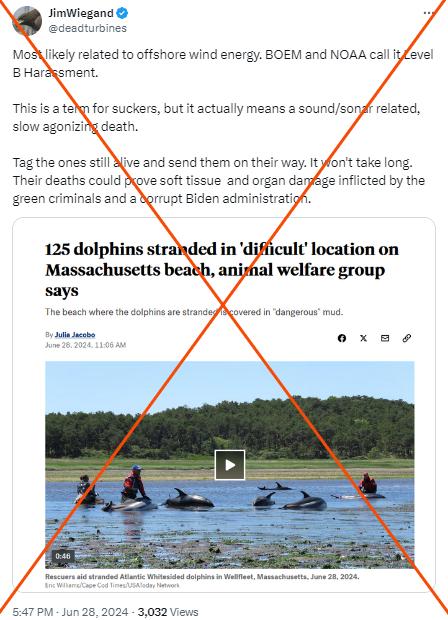
Historic dolphin stranding triggers baseless claims about wind farms
- This article is more than one year old.
- Published on July 9, 2024 at 20:17
- Updated on July 9, 2024 at 21:35
- 3 min read
- By Manon JACOB, AFP USA
Jim Wiegand, who posts regularly about "green fraud," said in a June 28, 2024 post on X that the stranding was "most likely related to offshore wind energy" -- claiming such projects trigger a "slow agonizing death" of marine mammals.
"Dozens of species will become extinct because of wind energy," Wiegand -- who goes by the handle @deadturbines on X -- also claimed on July 6.

More dolphins populate the 12-mile stretch along the shores of Cape Cod than almost anywhere in the world (archived here).
Local and national media reported extensively on the historic stranding (archived here and here) in Wellfleet, during which at least 10 dolphins died before rescue teams intervened (archived here).
The news, in turn, caught the attention of conspiracy theorists as the first large offshore wind farm of New England, located off the coast of Martha's Vineyard, started producing electricity at the start of the year.
But the claims that tie mass marine mammal deaths to wind activity are not backed by scientific evidence, experts at government and non-profit agencies told AFP.
"Causes of some mass strandings have included oceanographic barriers (e.g., trapped in bays), infections, biotoxins, human interactions, and malnutrition," Andrea Gomez (archived here), public affairs officer at the Greater Atlantic Regional Fisheries Office of the National Oceanic and Atmospheric Administration (NOAA), told AFP on July 3.
Research has shown a correlation (archived here and here) -- although no direct causation -- between wind speeds, ocean current speeds and an increased number of cetacean mass stranding events in Cape Cod.
But Gomez said no research ties large marine mammal deaths to offshore wind activity.
Unsubstantiated theories about wind farms causing marine mammal deaths have become frequent in recent years with the increase of both onshore and offshore projects (archived here) following the implementation of the Inflation Reduction Act, which calls for an accelerated shift to renewables.
However, mass stranding events of cetaceans have occurred for centuries around Cape Cod (archived here), marine experts told AFP. This is often due to specific oceanic and extreme weather conditions, according to the NOAA.
In 2012 -- preceding offshore wind activities near Cape Cod -- nearly 200 dolphins were stranded (archived here) over the course of a month.
Brian Sharp (archived here), director of marine mammal rescue at the International Fund for Animal Welfare (IFAW), which investigates stranding in the region, told AFP that the particular area of Cape Cod where the dolphins were found is a "global stranding hotspot" and has been for decades "due several factors including the geography, large tidal fluctuation, and the proximity to prey resource and known habitat."
Sharp added that "we have not noted anything unusual for this event, other than the sheer size."
Sharp pointed to similar events in 2020, early 2012, and 1998 as "some representative events that pre-date wind development in this area" (archived here, here and here).
Ronald Zellar (archived here), a NASA science researcher and lead author of a paper that examined mass stranding events in Cape Cod between 1999 and 2017, confirmed on July 8 the frequent occurrences of stranding incidents in the region, often involving "white-sided dolphins," the species found in the late June stranding.
"These events have been recorded for decades around Cape Cod and precede wind farm projects," he told AFP.
Ocean noise pollution
Underwater noise can disorient some marine species (archived here).
But such disturbances can come from many sources -- including military testing, oil and gas exploration, and ocean vessels -- they are not specific to surveying for wind energy projects.
In 2008, the US Navy acknowledged (archived here) in court that its sonar could cause "behavioral disruptions" and short-term hearing loss in dolphins and whales.
Scientists had previously accused the Navy of downplaying such noises, some of which the 1972 Marine Mammal Protection Act considers "harassment" (archived here).
Noise affecting marine animals travels differently depending on factors including water temperature.
Underwater acoustics expert Yanis Souami (archived here) previously told AFP that while the construction of renewable energy structures can produce substantial noise, "no significant impact has been noticed" during the operating phase of the wind farms.
The US Bureau of Ocean Energy Management (BOEM) also actively monitors and manages offshore energy activities (archived here).
During a series of whale strandings that happened off the East Coast of the United States in early 2023, Erica Staaterman (archived here), a bioacoustics researcher with BOEM's Center for Marine Acoustics, said that compared to oil and gas exploration, wind surveying equipment was "relatively small and produces little noise."
See more of AFP's fact-checks on claims about the environment here.
Copyright © AFP 2017-2026. Any commercial use of this content requires a subscription. Click here to find out more.
Is there content that you would like AFP to fact-check? Get in touch.
Contact us




